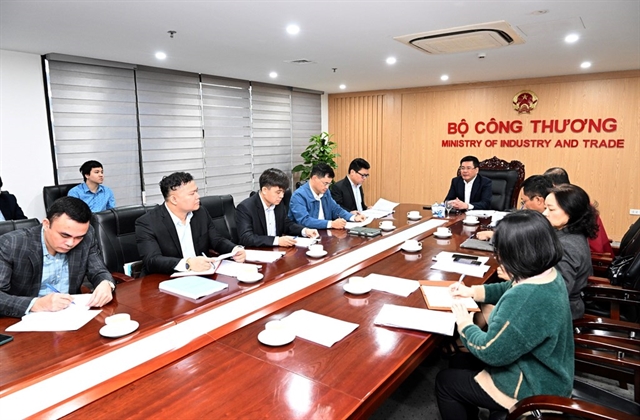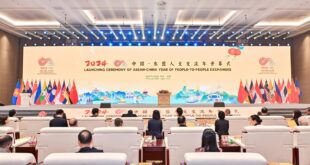
|
| At the working session. — Photo bnews.vn |
HÀ NỘI — The Ministry of Industry and Trade (MoIT) has identified the construction of the Key Industrial Law and the strategic advancement of industries within its purview as a central mission for this term, according to Minister Nguyễn Hồng Diên.
During a working session with the ministry’s units on Thursday, Minister Diên underscored the significance of developing the Key Industrial Law to establish an independent, self-reliant, and resilient industrial base. This initiative aims to contribute to rapid and sustainable economic development, positioning the country as a high-income society.
Resolution No. 29-NQ/TW, issued on November 17, 2022, during the sixth meeting of the 13th Central Committee, emphasised the importance of prioritising the creation and enhancement of institutional frameworks, policies, and specialised legal systems for national industrial development and key sectors. The resolution sets the direction towards industrialisation and modernisation until 2030, with a vision towards 2045.
One of the central tasks of the Ministry of Industry and Trade in the upcoming period is the urgent institutionalisation of policies, legal frameworks and strategies to promote the development of key national industries.
The project on the Key Industrial Law is currently under research and development to promote the development of foundational and strategic industries. It aligns with the directives outlined in Resolution No. 29-NQ/TW, taking into account the context of scientific and technological advancements, innovation, and achievements of the Fourth Industrial Revolution.
The legislation intends to facilitate a shift from broad-based manufacturing to in-depth research, design, and production in Việt Nam, integrating high levels of knowledge and technology to modernise the industry.
To ensure the quality of the law’s policies, MoIT has consistently sought opinions from reputable and experienced economic experts. The proposal for building the Key Industrial Law will be submitted to the Government as soon as possible for review and supplementary consideration in the National Assembly’s 2024-2025 legislative agenda.
In addition to constructing the Key Industrial Law, the continuous improvement of development strategies for priority industries is crucial.
After the Prime Minister approves the Development Strategy for the Textile and Garment, as well as Leather-Footwear Industries, the MoIT is tasked with formulating strategies for the steel, automobile, and dairy industries. These strategies aim to enhance self-sufficiency and sustainability, increase value-added, and foster the growth of industrial enterprises within these sectors. The ministry plans to present these strategies to the Prime Minister in 2024 for review and approval.
During the working session, Minister Diên highlighted key considerations for the development of the Key Industrial Law and the Development Strategy for the Vietnamese automobile industry, as well as other industries.
He emphasised the importance of maintaining the quality and timeline of these tasks and stressed the need for policies, laws, and development strategies for industries to align closely with the Party’s guidelines on industrialisation and modernisation, as outlined in Resolution No. 29-NQ/TW, and the direction of the Government to create a sustainable legal framework, ensuring consistency in promoting the development of foundational and priority industries for the nation.
Three policy proposals
The MoIT is currently developing the Key Industrial Law, which encompasses three policies.
First, it focuses on creating and implementing the National Programme for Industrial Development to overcome past shortcomings in strategic planning. This programme aims to ensure the practical allocation of resources for the focused development of essential industries and introduces mechanisms to monitor and supervise implementation.
The second policy aims to boost the competitiveness of vital industrial sectors to enhance investment efficiency and promote cluster-based industrial development. This policy ensures alignment with development plans at the national, regional, and provincial levels, considering industries, professions and industrial clusters.
The third policy aims to foster sustainable development in the industry by improving productivity and quality, transitioning toward a sustainable circular economy. It includes objectives to decrease energy consumption and emissions, and encourage eco-friendly production, addressing climate change and gradually meeting global standards set by advanced industrialised countries. — VNS
- Reduce Hair Loss with PURA D’OR Gold Label Shampoo
- Castor Oil Has Made a “Huge” Difference With Hair and Brow Growth
- Excessive hair loss in men: Signs of illness that cannot be subjective
- Dịch Vụ SEO Website ở Los Angeles, CA: đưa trang web doanh nghiệp bạn lên top Google
- Nails Salon Sierra Madre
 VnExpress News The News Gateway of Vietnam
VnExpress News The News Gateway of Vietnam




